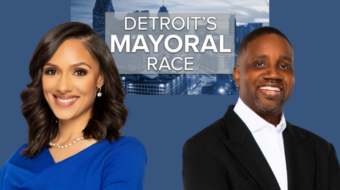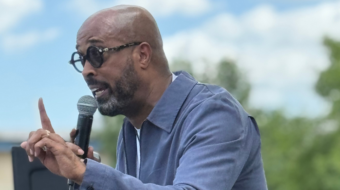
Despite a decision by twelve building trades unions and the Machinists that they will not send delegates to the Democratic National Convention, next year in Charlotte, N.C., indications are that the labor movement has no intention of abandoning President Obama’s reelection effort.
Organized labor will not allow a Republican to win the presidency, Michael Podherzer, the AFL-CIO’s political director said in an interview with Politico last week.
Podherzer made it clear that despite disappointment over deals the president has made with Congress, Obama is a far better alternative to any potential Republican candidate. “I don’t think that the labor movement will be on the sidelines with President Obama facing reelection,” he said.
The Machinists say that they are staying away from the Charlotte convention because their convention will be held at the same time in Toronto.
In a letter to Rep. Debbie Wasserman Schultz, D-Fla., the chair of the Democratic National Committee, Building and Trades Construction Department President Mark Ayers said he objected to the selection of North Carolina because of the state’s anti-union laws. Ayers also noted there were no union hotels in Charlotte.
Tom Owens, a spokesperson for the Building Trades department added, “We haven’t seen any action on jobs, so we didn’t want to be funding skyboxes and suites in Charlotte.”
AFL-CIO leaders in North Carolina disagree. They lobbied for the selection of Charlotte and, after the building trades announcement of its decision to stay away, issued a statement that “avoiding the convention would be counterproductive to efforts to build the labor movement in the Tar Heel State.”
Regardless of the controversy about the convention site, large unions that are part of the AFL-CIO have already come out for President Obama’s reelection effort.
The National Education Association was the first to endorse the reelection campaign earlier this year and a political resolution passed Aug. 16 at the Steelworkers convention in Las Vegas pledges that union to work for the president’s reelection.
Almost everyone you talk to in the labor movement, including top leadership in unions like the USW, however, is worried about being able to bring the membership along for Obama.
They believe that the way to make this happen is for Obama to come out swinging for jobs. They want the president’s plan to be the type of bold plan laid out recently by Rep. Jan Schakowsky, D-Ill.They support her bill because through fair taxation of the wealthy it has the government directly creating millions of jobs in infrastructure and public services.
The labor movement is trying to make clear to the administration that more fight is needed on the jobs front.
Another important point is that the discussions about labor’s role in the 2012 elections come amidst a major shift in the AFL-CIO’s entire approach to its election work.
AFL-CIO President Richard Trumka talked about the shift publically in May when he said the days when unions just handed money to endorsed candidates were over.
He outlined a strategy that emphasizes building a grassroots infrastructure for labor’s political activity and mobilization of voters, particularly on the state level. A state-of-the-art phone bank built, owned and operated by a local union, for example, can help unions continue their political activity in between and after elections.
The recall campaigns in Wisconsin and the campaign to repeal the anti-union SB 5 law in Ohio are examples of this new approach by the labor movement, union activists say.
Podhorzer is careful to point out, however, that the new direction does not mean unions will abstain from the presidential race, campaigns that have national significance or from campaigns that involve the labor movement’s proven friends.
“I think our approach will be more toward investing our resources where there is a really pro-worker candidate and where there is a good opportunity to win,” Podhorzer said. He says that someone like Ohio’s Sen. Sherrod Brown or someone like Elizabeth Warren, were she to challenge Sen. Scott Brown, R-Mass., are the types of candidates that the AFL-CIO would support.
He says Blue Dog Democrats that don’t support labor’s agenda will not be getting active union backing.
Unions are also planning to change how they finance their electoral activity.
The AFL-CIO’s executive committee approved creation last month of a “super-PAC” that will be allowed to raise and spend unlimited amounts of money. Thus far the AFL-CIO has been limited by election law to contacting only its members, but with the super-PAC, it can bring its message to non-union voters as well.
Podhorzer says the new approach is part of a strategy to put more emphasis on issues of importance to labor and help the labor movement expand outreach. “It is not meant to compete with Karl Rove and raise hundreds of millions of dollars,” he said.
Some believe the decision by the buildings trades unions will send a message to Democrats that they should not take labor support for granted. They don’t think sending the message will hurt the chances of the president’s campaign and almost everyone expects a big push by the AFL-CIO next year to reelect the president.
Photo: Bernard Pollock – AFL-CIO // CC 2.0










